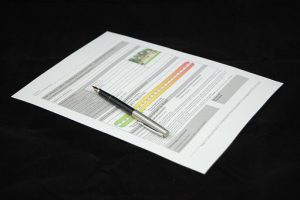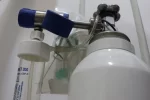
In order to be considered an appropriate candidate for employment and be able to find a job easily, besides state licensure, you should have some additional qualifications for respiratory therapists in the U.S.
Those qualifications are often measured by professional certification provided by the National Board for Respiratory Care, Inc. (NBRC).
Possessing these credentials demonstrates that a respiratory therapist has met minimum licensing requirements and reached advanced-level training and specialized skills in the respiratory therapy profession.
Page Navigation
Why NBRC Certification?
The National Board for Respiratory Care (NBRC) is a not-for-profit, voluntary credentialing board.
It is sponsored by four, professional organizations, including the American Association for Respiratory Care (AARC), and its certificate has become an industry-standard in 49 states.
If you become a licensed respiratory therapist, it shows that you possess all the necessary skills and knowledge.
In Alaska, there is no state licensure, but still, respiratory therapists use NBRC credentials to differentiate themselves in this competitive profession.
The NBRC has been credentialing respiratory therapists since 1960 and this organization has its own set aims and goals, including:
- To provide high-quality, voluntary credentialing examinations
- To establish standards to credential respiratory therapists
- To advance medicine through the promotion of respiratory care
- To support ethical and educational standards for respiratory care
- To support respiratory education through cooperative efforts with accrediting agencies
It is well known that therapists who are credentialed by the NBRC frequently receive higher salaries and premium employment opportunities and get employment easily.
Being that the NBRC’s credentials are recognized nationally, those therapists who plan to relocate from one state to the next will be accepted and hired no matter in which state they are applying for a job.
The NBRC offers the following credentials:
- Certified Respiratory Therapist (CRT)
- Registered Respiratory Therapist (RRT)
- Neonatal/Pediatric Respiratory Care Specialist (CRT-NPS or RRT-NPS)
- Sleep Disorders Specialist (CRT-SDS or RRT-SDS)
- Certified Pulmonary Function Technologist (CPFT)
- Registered Pulmonary Function Technologist (RPFT)
Now, the CRT and the RRT credentials are considered to be the standards for licensure, and all US states require respiratory therapists to possess the CRT credential.
Ohio, California, and New York require licensed respiratory therapists to possess the RRT credential.
Only when they reach these credentials, respiratory therapists can pursue the NBRC’s specialty certifications.
Certified Respiratory Therapist (CRT)
The Certified Respiratory Therapist (CRT) credential is administered and offered by the NBRC as an entry-level credential.
So as to apply for state licensing, applicants must earn the CRT credential by passing the Therapist Multiple-Choice (TMC) Examination.
The only way to qualify for this exam is to successfully graduate from respiratory therapy programs that have been accredited by the Commission on Accreditation for Respiratory Care (CoARC).
Your options are numerous, being that there are currently 441 CoARC-accredited programs in respiratory therapy available across the United States.
Aspiring respiratory therapists can choose the level of education they want to reach, either the associate degree or the bachelor’s level.
The main aim of the Therapist Multiple-Choice (TMC) Examination is to test a graduate’s knowledge and skills and it consists of 160 multiple-choice questions in three content areas:
- Patient Data Evaluation and Recommendations
- Troubleshooting and Quality Control of Equipment and Infection Control
- Initiation and Modification of Interventions
You have three hours to complete the examination and you can take the exam only if you are at least 18 years old and have either graduated from a CoARC-accredited associate’s degree program in respiratory therapy or you are in the process of completing a CoARC-accredited bachelor’s degree in respiratory therapy.
Furthermore, candidates that currently hold the Canadian Society of Respiratory Therapists (CSRT) credential are also qualified to sit for the CRT examination.
Registered Respiratory Therapist (RRT)
The Registered Respiratory Therapist (RRT) credential is well known as the advanced credential.
Only graduates of CoARC-accredited respiratory therapy programs or CRTs who possess at least four years of clinical experience following their CRT certification are considered eligible candidates for this credential.
CRTs who possess at least four years of clinical experience must also possess the required college credit hours, including specific basic science courses.
So as to reach these credentials, candidates need to pass the same Therapist Multiple-Choice (TMC) Examination required for the CRT credential, but with a higher score, and a Clinical Simulation Examination (CSE).
The Clinical Simulation Examination (CSE) consists of 22 separate patient management problems and you will be given four hours to complete this portion of the examination.
The aspiring licensed respiratory therapists must meet one of the following to quality to sit for the Clinical Simulation Examination (CSE):
- Be a recent graduate of an associate or bachelor’s degree program in respiratory care accredited by CoARC. They are required to complete the Therapist Multiple-Choice (TMC) Examination with a higher score that is determined as necessary for RRT certification.
- Be a CRT and have four years of full-time clinical experience in respiratory therapy under the supervision of a licensed medical provider, plus possess at least 62 semester hours of college credit in the following courses: chemistry, physics, microbiology, mathematics, and anatomy and physiology
- Be a CRT and possess a bachelor’s degree in an area other than respiratory care with college credit level courses in chemistry, mathematics, anatomy and physiology, physics, and microbiology. These candidates must also possess at least two years of full-time clinical experience in respiratory care and at least 62 semester hours of college credit from an accredited college or university.
What to Know about the Three-Year Eligibility Limit?
It is worth noting that you will have three years after graduating to complete the examination process for the CRT or RRT credentials.
Those respiratory therapists who do not meet the three-year time limit must retake and pass the Therapist Multiple-Choice Examination (TMC) with the higher cut score necessary for RRT credentialing.
The Changing Face of Respiratory Therapy Testing and Certification
Since January 2015, the NBRC instituted the Therapist Multiple-Choice Examination (TMC), which is a new testing structure that combines the old Entry-Level CRT Examination and the written RRT examination into one.
Their main goal with this innovation was to reduce the number of examinations required to earn the RRT credential.
So, Ohio and California accepted these new licensing standards, and these states now require new respiratory therapists to earn the RRT credential as the minimum credential for meeting state licensing requirements.








